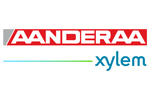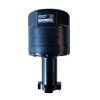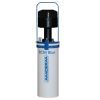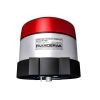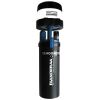Aanderaa ZPulse Doppler Current Sensors
Features
- ZPulse technology improves data quality, sampling speed and reduces power consumption
- Built in solid state three axis tilt compensated compass
- Smart sensor for easy integration on the SeaGuardII platform or 3rd party data loggers
- Expedited repair and warranty service
- Lifetime technical support
- More
Overview
The Aanderaa ZPulse Doppler Current Sensor (DCS) is a single-point current sensor designed for use with the Aanderaa SeaGuardII platform or external measurement systems using the RS-232 interface. The DCS measures in both directions on each axis and is insensitive to disturbance from vortex speeds around the sensor itself and the mooring line when the forward ping feature is enabled. Multi-frequency acoustic technology improves data quality and sampling speed as well as reduces power consumption.
Design
It is designed for commercial as well as research use. The DCS sensors are based on the backscatter acoustic Doppler principle. The solid-state sensor is well suited for monitoring low current speeds due to its lack of moving parts. Because the sensor starts measuring 0.4 to 1.0 meters from the instrument, the effect of marine fouling and local turbulence is minimized.
In The News
From Paddles to Phytoplankton: Studying Vermont’s Wildest Lakes
For six months of the year, Rachel Cray, a third-year PhD student at the Vermont Limnology Laboratory at the University of Vermont, lives between a microscope and her laptop, running data. For the other six months, she is hiking and canoeing four of Vermont’s lakes, collecting bi-weekly water samples. Cray studies algal phenology across four lakes in Vermont, US, that have low anthropogenic stress—or in other words, are very remote. Funded by the National Science Foundation Career Award to Dr. Mindy Morales, the lakes Cray researches part of the Vermont Sentinel Lakes Program, which studies 13 lakes in the area and, in turn, feeds into the Regional Monitoring Network, which operates in the Northeast and Midwest US.
Read MoreReimagining Water Filtration: How Monitoring and Science Enhance FloWater Filtration Systems
Over 50% of Americans think their tap water is unsafe , according to the Environmental Working Group (EWG). Other recent surveys have found that number to be as high as 70% of persons surveyed. Whether due to increased public awareness of water quality issues or confusion about how municipal water sources are regulated, there is a clear distrust of tap water in the United States. According to industry expert Rich Razgaitis, CEO and co-founder of the water purification company FloWater, this issue creates a damaging cycle. Razgaitis explained that the health and environmental problems associated with contaminated water aren’t the only issues. As people become increasingly aware that some tap water is unsafe, they resort to bottled water.
Read MoreMonitoring New Hampshire’s Aquatic Ecosystems: Continuous Data Collection in the Lamprey River Watershed
New Hampshire’s aquatic ecosystems provide a range of ecosystem services to the state and region. Resources and services like clean water, carbon storage, climate regulation, nutrient regulation, and opportunities for recreation all depend on New Hampshire’s aquatic ecosystems remaining healthy. Jody Potter, an analytical instrumentation scientist at the University of New Hampshire (UNH), is studying these aquatic ecosystems in hopes of developing an improved understanding of ecosystem services and their interactions with climate change, climate variability, and land use changes. [caption id="attachment_39799" align="alignnone" width="940"] Aquatic sensors in the Merrimack River in Bedford, NH, with I-293 in the background.
Read More







